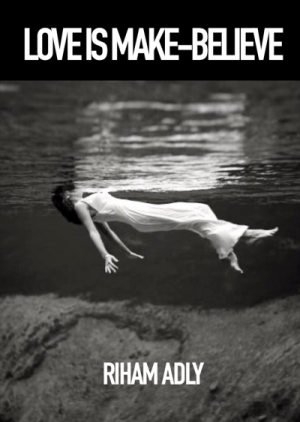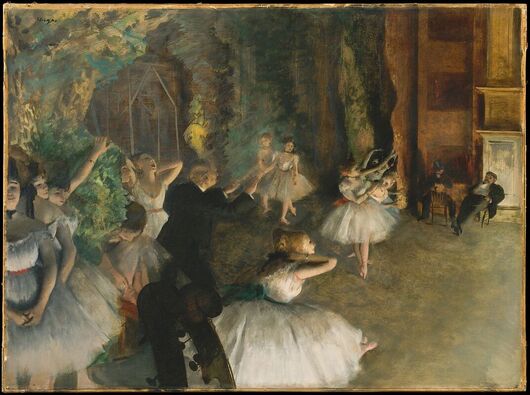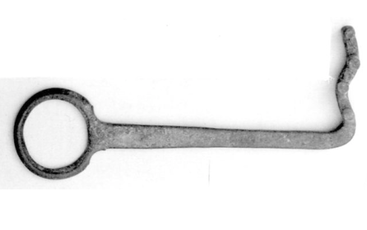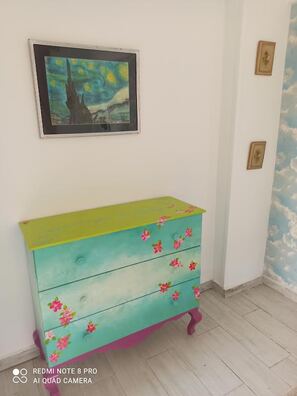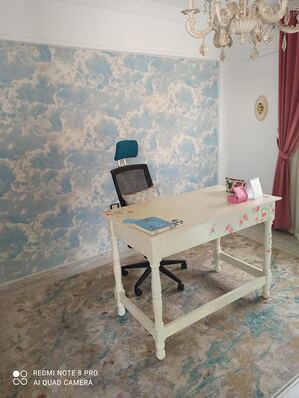|
Love is Make-Believe Riham Adly Clarendon House, 2021 The Ekphrastic Review was pleased to connect with Riham Adly about her recent book, Love is Make Believe, a collection of flash fiction that includes a few ekphrastic stories. We will chat with her first about her work, and then you can read the stories below. The Ekphrastic Review: Is it correct to say that your flash fiction collection, Love is Make-Believe, is the first English flash book by an Egyptian woman? Riham Adly: Love is Make-Believe is the first flash fiction collection in English written by an Arab/ African (Egyptian)/ Middle-Eastern woman. Is flash fiction widespread in North Africa or the Middle East, in languages other than English? Is there a tradition of shorter story telling that resonates, or is the form quite rare? Flash fiction is an emerging art in the Middle-East. I first discovered it in 2018 by few Egyptian authors writing in Arabic. It's been an honour to have been asked to translate flash for the debut issue of Arab-Lit magazine. Tell us about your experience writing these stories. What was your process like? Where did you take inspiration from? In what ways did the creation of this collection transform you? Were there surprises along the way? I've always had the poet part of me more articulate than the short story writer part. When I discovered flash fiction I was able to utilize both aspects in my writing as flash itself is a mix between poetry and narrative writing. I started out writing stories without really thinking far ahead about a collection. Stories just came to me, some visited and were pleasant, some demanded to be written even when I didn't want to at times. I've always felt like a conduit vessel where ancestral voices and voices of the collective subconscious sought me out in particular. I would listen to voices urging me to tell a story, sometime stories too difficult to write, like stories about honour killings in "Why my Mother Loves the Color Black" or stories about female genital mutilation still carried in Africa in "The Brief Chronicled History of The Girl as told by the Realist but yet Optimistic African Fortuneteller" or stories about mental illness in "Josephine" or those about gender in "Mona Decides to Die but let's the Weather Decide" and so forth. By the time I'd written over 60 pieces of flash, I realized they all followed a theme and had come out as a collective voice in a single work and hence the collection. A couple of your flashes in Love is Make-Believe are inspired by art. How did this happen? Do you see yourself moving in an ekphrastic direction in the future? Yes, three of my stories are inspired by art. My first ever flash was " The Scream" inspired by Edvard Munch's The Scream and it first appeared in the The Ekphrastic Review. Art as in paintings is also another potent form of story-telling. Everytime I'd explore a painting or a work of art I feel the need to find out its story or message. I came across The Rehearsal of the Ballet, one Edgar Degas' ballerina paintings and somehow started seeing the words flow with movement in my head. My protagonist from "Prettier than a Ballerina" was then born. The same happened when I came across the work of a more contemporary artist , Nicolay Reznichenko with his painting of a women holding a key to operate a gentleman looking toy or puppet, from there I was inspired to write my own story "It's All About the Right Key." All three stories are about Egyptian women and their struggles with having their voices heard at all. I would love to produce more work inspired from art. I’m wondering about the tradition or contemporary practice of literature about art, in Egyptian culture. Does this have a long history or is it something that new? I believe it is relatively new. Tell us about some of your favourite artists. Whose work do you find inspiring to teach or write about? I find Van Gogh's work to be quite stimulating. I also appreciate the works of the likes of Renoir and Monet to an extent, but I am incredibly moved by Salvador Dali's surreal paintings. I've always wanted to create stories inspired from his art. On a more local front. Artist and caricaturist Mohamed Abla is one of my favourite Egyptian contemporary artists. What kind of barriers or challenges have you found both at home and in the world as an Egyptian Muslim woman writer? How important are any of these aspects of identity to your fiction? It is deeply ingrained in our culture that a woman is an inferior creature. Our voices, opinions, and presence, are constantly ridiculed and suppressed. We are expected to pleasantly and voluntarily succumb to what society deems appropriate. We are ridiculed when driving cars, when organizing marches or demonstrations, molested when taking on public transportation, judged and constantly criticized for what we wear and how we show up in the market and business world. Emerging women writers will always have to face such challenges when writing in their mother tongue. I've always found expressing in my mother tongue a scary affair for I'm always told to shut up. I decided to adopt the English language as my primary language of expression and creativity for when I speak it, I am safe, I am capable, I am creative and no one tries to shut me up. What’s next for Riham? Riham has been battling chronic illness and depression but one can only see the brightest of stars in the darkest of nights. After successfully launching my collection Love is Make-Believe I feel more empowered now to speak my truth and heal through writing. I'm working on a memoir centered around food-related trauma and also putting together my "Writing from the Subconscious" flash fiction workshop where I delve into the inner workings of the psyche, discovering what drives us and what limits us and what separates us from the Other. I explore concepts of polarity and the shadow, attachment patterns during childhood and their effect on our current relationships and also dip a little in dream symbology, all through the medium of flash fiction, crafting specific lessons and prompts that could help shape better characters, setting and metaphoric language. Visit Riham's website to learn more about her stories and work. www.rihamadly.com ** Click here to read Riham's story, "The Scream," published by The Ekphrastic Review in 2018. Prettier Than a Ballerina The thought—unlike some of my floating daymares—is calm, pleasurable and very much beguiling: A ballerina pirouettes and flips inside the light bulb, not without the flame-shaped halo hugging her. Rhododendrons— like the ones you used to get me— in the long-necked vase on the table stare back, disapproving. I know, I know. It’s probably my waning eyesight to blame and that really bright bulb, but really, it all depends on where I’m standing. This one here twirls her skirt in the light when I’m looking sideways. The view of the Nile from these windows is no longer spectacular. Twenty-seven floors below, I see masses in queues in front of the Faten Hamma Cinema. I see young couples feeding the river empty Pepsi cans and greasy Burger King wrapping paper. I see school kids in stripped green uniform mistaking the flowerbeds for trash bins. I see street hawkers calling out on top of their lungs in the siesta hour when there’s no one out there except for stray cats. I also see the note— it’s been with me the whole time you weren’t— all frayed and tattered from years of hiding in secret pockets stitched in dresses and bags and pillows and even hats. Its words— that read like something from one of those happily-ever-after movies we watched in our youth— slowly disappearing, one after another, running away. I want to run away too, but there’s also this girl. She looks a lot like Faten Hamma—-the actress the Cinema was named after. She looks familiar, like someone I must’ve known. I make a habit of watching her. One can’t be too trusting. I can’t ever tell the colour of her eyes, they’re like mirror I don’t want to look at. I’m being ridiculous again. Oh, no, no, no. That’s what she wants me to think. But, she indeed looks like a hamama (a dove). Remember when you used to call me “dove”? She comes in every week, walking around like she knows everything there is about anything, saying the note’s in my handwriting, that I made it all up. She argues and argues with me, like she has the right to. She makes me sick and because of it she brings in a doctor, a specialist, she says. “How long does she have left? Please tell me. ” Today those vague eyes of hers have a sad sparkle as she pleads with her doctor. They look like they’re coated with some sort of glaze. Tears? She looks…pathetic. Crossing Boundaries. Follow me. You’ll love it. The dying note had said. I know what they’re both up to. I’m leaving tonight, and nothing will stop me but first I have to go over the list of things I’m not leaving behind:
The following story was inspired by a painting by Nicolay Reznichenko . Click here to view it.
It’s Really All About the Right Key The congregation of metal clanked with her every move in an inconsolable jingle. Farrah got used to the sound of her burden as the keychain, toiling above the hill of her breasts, got heavier every day. Everything and everyone in Farrah’s life had a key. The key to her husband’s heart was his stomach. The key to his generosity was her obedience, the key to his pleasure was her vagina. Her kids had keys too: hugs, praise, and that firm voice of hers. Her parents, her friends, and even her employer had their own set of keys. One day while Farrah counted her keys, she realized, that one, very important key, went missing. Farrah looked for it everywhere, under her bed pillows, in the wardrobe closet, in the drawers of her desk. She even looked inside her fridge, in the kitchen cupboards and in the belly of her stove. Where could it have gone? Farah looked down at her left breast behind which her heart lay shielded in its ribcage, unreachable, indestructible. She remembered a time when her heart was a room without any trapdoors or contraptions--- a time when it could skip and sing before reaching the outskirts of childhood and growing into the curse of womanhood. She tried to quiet and shush her heart, but it pushed and punched its every beat a cry, a plea. There was only was place left where she dared not look. The chest of drawers high up in the storage room where her most painful memories sat, neatly folded and pushed away. My key, her heart demanded, find my key. When she reached the top shelf she found her book of secrets, and inside the book she found a map. The map led to a cottage nestled in the depth of pocketed time. She walked the length of her shadows, traversing the recollection river. Aubergine- hued Lily thickets lining the path with their black devil’s tongue stood like infantrymen ready to shoot. When she last saw them a lifetime ago they had had soft petals of white and pink. Her skin pricked and she felt a fever burn inside when she stood in front of the unlocked gate. Inside the cottage she glimpsed the keeper of her heart’s key. Not much had changed except for the silver that adorned his beard. His eyes still held the saddest shade of purple. Time lay curled in his lap like a cat. She watched the man that was not her husband cradle his pain and play with his own key chain. Grief spilled in torrents when their eyes met. “Did you come back for me?” The keeper asked, “I still have your key.” She remembered their deep passion, how he filled the dead space of loneliness in her heart, how he watered the dead flowers once blooming with her youth. She remembered the hushed calls, the secret letters, and the cloying sweetness of roses. “Adultress,” they had called her. “A sinner.” She remembered the whiplashes, the cries, the pointing fingers, the accusing eyes, and the weeping of her children pulled from her grasp. If only their love hadn’t been a sin. She held the keeper’s eyes and let him see all she could not speak. “I’ll sit here and wait then, till you’re free,” her keeper said. “You still have my keys. You will always have my keys.” So she left the cottage and abandoned her key, letting her heart sit in its prison, but was her heart really imprisoned? Did it need a key? The inconsolable jingle of her chain guided her back to the sound of her children playing hide and seek. Time with its lancinating edges walked her back to the high shelf in the storage room. “Hi Honey.” Her husband chimed, his fingers wrapping her waist in a tight grip. She stood taller, her head held high. He must be proud, she thought. For people bless him even when he’s hit her/ cursed her/ belittled her, even when has sinned. She smiled at him, letting him hear the metallic tinkle of her key chain. His grip of steel tightened. “Darling, what would you like to have for lunch today? Would you like the lamb and lentil soup with rice pilaf and some Tztziki?” She reached out and kissed him full on the mouth, “Try to come home early today, I’ll be wearing your favourite dress.” His grip relaxed. She smiled again. She smiled more and more every day, enjoying the sound of her keys’ clanking jingle. Riham Adly
0 Comments
Your comment will be posted after it is approved.
Leave a Reply. |
The Ekphrastic Review
COOKIES/PRIVACY
This site uses cookies to deliver your best navigation experience this time and next. Continuing here means you consent to cookies. Thank you. Join us on Facebook:
Tickled Pink Contest
April 2024
|

